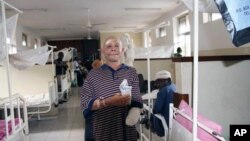United Nations human rights officials report a spike in ritual attacks and killings of people with albinism in Tanzania. They are calling for greater protection for these people who face a dire situation and are extremely vulnerable.
The U.N. Human Rights Office reports five new attacks against people with albinism occurred over an 11-day period in Tanzania this month. This, it says, brings the number of attacks since 2000 to 151, including 74 murders.
Albinism is a genetically inherited condition, in which people lack pigmentation. While it is very rare in most parts of the world, affecting one in 20,000 people, it is quite common in sub-Saharan Africa. In Tanzania, one in 1,400 people are born with this condition.
U.N. human rights official Alicia Loudono, who has just returned from a mission to Tanzania, says she is very concerned by the marginalization, discrimination and persecution to which people with albinism are subjected in Africa. She says they are portrayed as ghosts, as devils, as people who bring bad luck, death or sickness.
“The worst form of discrimination is the ritual attacks. These are rooted in superstition….Body parts of persons with albinism are used for witchcraft purposes. There is this belief in certain countries that body parts have magical powers and if used in potions produced by witch doctors it will bring wealth and power," said Loudono.
As a result, people with albinism are mutilated for their body parts. Loudono says a limb can fetch thousands of dollars on the black market. She says a person who has had an arm or a leg cut off is usually left unattended and bleeds to death.
Victims who survive usually receive no communal support or legal assistance.
Non-governmental organizations have documented 328 attacks in 24 different countries since 2000. They include Burundi, Ivory Coast and Swaziland. Most attacks occur in rural areas.
Early in 2013, there was a spike in the number of these ritual attacks. Loudono says on her trip to Tanzania, everyone linked the recent attacks to the presidential election set for October 2015.
“There is this common knowledge of people with albinism, that attacks increase when there is [an] election. One of the reasons they say is that there are some politicians that use witchcraft for gaining power. This is part of their belief…for winning elections, for being more rich, etc," she said.
While in Tanzania, Loudono visited several centers for children with special needs where children with albinism are warehoused. She says these centers were originally intended as temporary, but have now become a long-term solution.
She says the conditions in which these children are kept are appalling. They are overcrowded and unhygienic, and the children are subject to corporal punishment, threats and sexual abuse.
The worst aspect of these centers, she says, is that these children lose all contact with their families.
Instead of segregating these children from their communities, she says, the Tanzanian authorities should make every effort to integrate them back into their homes and societies.








